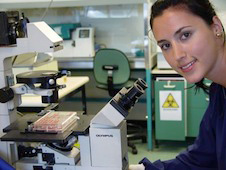 “I took a couple of years off after high school, but a number of my friends came straight to Otago University, so when it was time for me to consider where to study I had a group of friends already established at Otago, telling me what a great place it was to study and live. “
“I took a couple of years off after high school, but a number of my friends came straight to Otago University, so when it was time for me to consider where to study I had a group of friends already established at Otago, telling me what a great place it was to study and live. “
Julia Prier says her choice of a place to study wasn't just based on not wanting to study at home. She came to Otago and took Health Sciences First Year, finding the wide variety of topics studied during the course really stimulating.
“I really enjoyed the immunology papers I took after that, as well as aspects of biochemistry and genetics study. I completed a BSc Honours in Microbiology and Immunology in 2010, and went straight from there to a job as Assistant Research Fellow in a lab that's based in Anatomy and Biochemistry. We're using optogenetics to explore pathological pathways in the parkinsonian brain.”
Optogenetics is a research tool giving much higher definition in results than more traditional stimulating electrodes. Julia explains: “Optogenetics works using specific frequencies of light to trigger neural activity in the brain. The technique is much more specific and was named “Technique of the Year” by Nature magazine in 2010. It's quite exciting to be using such cutting edge technology in my work.”
Julia is taking time out from study to consider further options – she'd like to perhaps pursue an academic career, so work that keeps her in the same field of science is very useful – she's keeping up to date with new technology and learning many useful skills.
“I'm thinking about doing a PhD in the future, and I know that the strength of my Otago degree will work well for me when it comes to applying for scholarships and for posts overseas.“